The Life and Works of George Whitefield (13 vols.)
Digital Logos Edition
Overview
The booming voice of George Whitefield preached to as many as tens of thousands of eager listeners at a time—often out in the fresh, open air rather than a more ecclesiastical setting. Known for his theatrical style of delivering sermons, he is arguably the most influential evangelist of the eighteenth century. In The Life and Works of George Whitefield (13 Vols.), hundreds of letters and journal entries illuminate Whitefield's character and his earnest desire to bring all he encountered to Christ. Five biographical works are included, each shedding a unique light on this traveling preacher who crossed the Atlantic ocean to America an astonishing number of times throughout his life. Whitefield's associations with the Wesley brothers, Charles and John, are also noted, particularly in an account of John Wesley and George Whitefield's dealings with the Church of Scotland, aptly titled John Wesley and George Whitefield in Scotland.
Highly influential both in the beginnings of the Methodist Church and as a key figure in the Great Revival in America, Whitefield's fiery passion for evangelism affected thousands of people during his lifetime, and continues to inspire and challenge all today who read his life story and writings. The Life and Works of George Whitefield (13 Vols.) are more accessible than ever in digital form. In the Logos Bible Software edition, Scripture references contained in Whitefield's writings are instantly viewable, and the hundreds of correspondences contained in this collection can be searched with the click of a mouse.

- Contains multiple biographical accounts of one of the eighteenth century's finest traveling evangelists
- Includes hundreds of letters written by George Whitefield
- Sermons and historical accounts of Whitefield's preaching excursions
Reading the life of such a great saint—this Christ-loving, gospel-centered minister—has served to rekindle my passion for the gospel and rejuvenate the love of God in my soul more than once.
—Online Reviewer
- Title: The Life and Works of George Whitefield
- Authors: George Whitefield, John Gillies, J. B. Wakeley, D. Butler, A. S. Billingsley, Robert Philip
- Volumes: 13
- Pages: 5,589
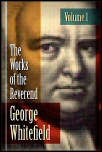
This first volume contains nearly five hundred correspondences written between 1734–1742. It is said of these letters in the preface, "his friends, and even his enemies (should there be any such) will here openly behold his unwearied diligence, undaunting firmness, noble disinterestedness, and exceeding usefulness in the work of the ministry; also, his remarkable fidelity in friendship, exemplary piety, and fervent zeal for the prosperity of pure and undefiled religion."
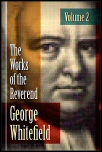
A continuation of letters written by Whitefield, volume two contains over a decade of correspondences, spanning the years from 1742–1753. Whitefield's letters cover numerous topics, including reproaches of sin, words of encouragement, and historical facts regarding his life and travels.
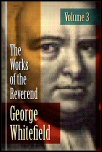
Over five hundred letters make up this third volume of Whitefield's writings. As well as more letters of encouragement, reproach, and praise, this resource includes correspondences regarding building and founding of the Bethseda orphanage in Georgia. The orphanage was established with money that Whitefield collected during his evangelical travels around America, and the letters give a glimpse into the beginnings of it.
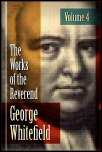
Volume four contains further correspondences of Whitefield, including an answer to the bishop of London regarding the difference between desiring to live a godly life and actually living it, a letter to the religious societies of England regarding worldliness and temptation, and a letter to the inhabitants of Maryland, Virginia, North, and South Carolina regarding the treatment of slaves. A selection of prayers is also in this volume.
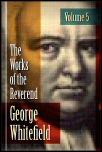
The Works of the Reverend George Whitefield, Vol. 5 contains thirty-one sermons, including topics such as walking with God, righteous living, temptation, and resting in Christ. Whitefield's bold words are lucid and focused, pointing his audience towards godly living.
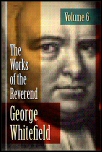
Twenty-six sermons end the six volume set, The Works of the Reverend George Whitefield. He preaches on texts from Luke, John, Acts, 1&2 Corinthians, Ephesians, Philippians, 1 Thessalonians, 2 Timothy, Hebrews, and Zechariah.
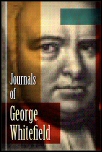
Journals of George Whitefield takes a close-up look at the life of this great evangelist, from his own pen. Inspirational and thought-provoking, these journals encapsulate the life, character, and wisdom of this godly man. Also contained in this set of journals are the two brief autobiographical resources entitled A Short Account of God's Dealings with the Reverend George Whitefield and A Further Account of God's Dealings with the Reverend George Whitefield.
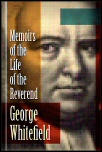
Twenty-two chapters make up these memoirs of Whitefield. Included at the end of this brief memoir is an excerpt from the London Evangelical Magazine, and the book ends with a call to Christ.
John Gillies was an author and Scottish friend of George Whitefield.
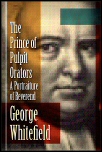
Written a century after the death of Whitefield, The Prince of Pulpit Orators: A Portraiture of Rev. George Whitefield is a series of character sketches and anecdotes depicting his life. J. B. Wakeley paints a vivid picture of the character and person of Whitefield with a concentrated effort placed on the description of the delivery and content of Whitefield's sermons. This work also goes by the title, Anecdotes of the Rev. George Whitefield.
J. B. Wakeley was a nineteenth century author who also wrote biographical resources regarding the Wesley family.
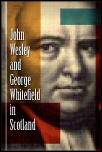
Largely written with data collected from the journals of John Wesley and George Whitefield, John Wesley and George Whitefield in Scotland is a narrative of the visits of these two well-known evangelists to the country of Scotland. Documenting the travels and the subsequent effects of those journeys on the Church of Scotland, this resource also details the Methodist Revival in Scotland, and is a historically significant documentation of God's work in the Church of Scotland during that time period.
D. Butler was a minister and writer of the nineteenth century.
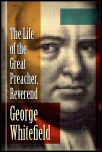
"Whitefield was a flame of fire. And as that flame has shone so bright, enlightened the minds and warmed the hearts of so many, it is very important to keep it burning," begins the preface of this biographical work. Thirty-seven chapters make up this resource, taking the reader on a journey through the remarkable life of this traveling preacher. Whitefield spoke to hundreds of thousands of people during his extensive travels, encouraging and inspiring all who heard this great expositor and celebrity—and all who read his life story will be touched as well. This resource also contains two of Whitefield's sermons, entitled "The Kingdom of God" and "God, A Believer's Glory."
A. S. Billingsley was a nineteenth century reverend and author.
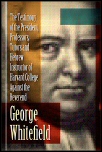
The Testimony of the President, Professors, Tutors and Hebrew Instructor of Harvard College Against the Rev. George Whitefield
- Authors: Edward Holyoke, Henry Flynt, Edward Wigglesworth, Judah Monis, Belcher Hancock, Joseph Mayhew, Thomas Marsh, John Winthrop
- Publisher: Boston
- Publication Date: 1744
- Pages: 15
A brief criticism of George Whitefield, this resource expounds on several specific points of concern. Supposing him to be impulsive in his efforts to be led by the Holy Spirit, the authors felt that he was also "an uncharitable, censorious, and slanderous man". The writers of this resource were also vigorously opposed to the idea of the itinerant preacher, and expressed the supposed dangers of this expository style at length. The Testimony of the President, Professors, Tutors and Hebrew Instructor of Harvard College Against the Rev. George Whitefield gives a fascinating glance at Whitefield through the lens of his critics.
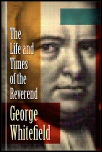
Robert Philips says of his writing: "this work is chiefly from Whitefield's own pen. So far as it is mine, it is in his own spirit." Aiming to keep the tone of the book true to the character of Whitefield, Philips compiled a detailed account of this great preacher's early years, schooling, and travels.
Robert Philip (1791-1858) wrote numerous resources, including his more well-known work, The Experimental Guides.
George Whitefield was born in Gloucester, England in 1714. The son of a poor widow, he went on to study at Oxford, where he met Charles and John Wesley. The Wesley brothers were a part of what was referred to as the "Holy Club" on campus, which Whitefield joined and by which he was quite influenced, later becoming the president. His passion for theater and public speaking made him quite popular quickly as he became a traveling evangelist, and his projective voice allowed him to speak outdoors rather than in a church setting. He believed in preaching his sermons without notes in order to allow room for the Holy Spirit to guide his speaking, and was known for his theatrical delivery. In 1738, he came to America for the first of seven trips he would make across the ocean. During this first trip, he founded the orphanage Bethseda, just outside of Savannah, GA. Throughout his life, he toured all over New England, as well as England, Scotland, and Wales, preaching to crowds of up to tens of thousands at a time, greatly influencing the Great Awakening and the early Methodist Church. He died in 1770.
Reviews
5 ratings

Kevin Bratcher
6/12/2018

Faithlife User
2/8/2018

Schamma
10/30/2014

Rev Dr Paul Blackham
2/17/2014

Joel Houston
9/25/2013